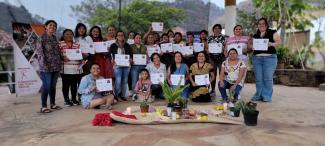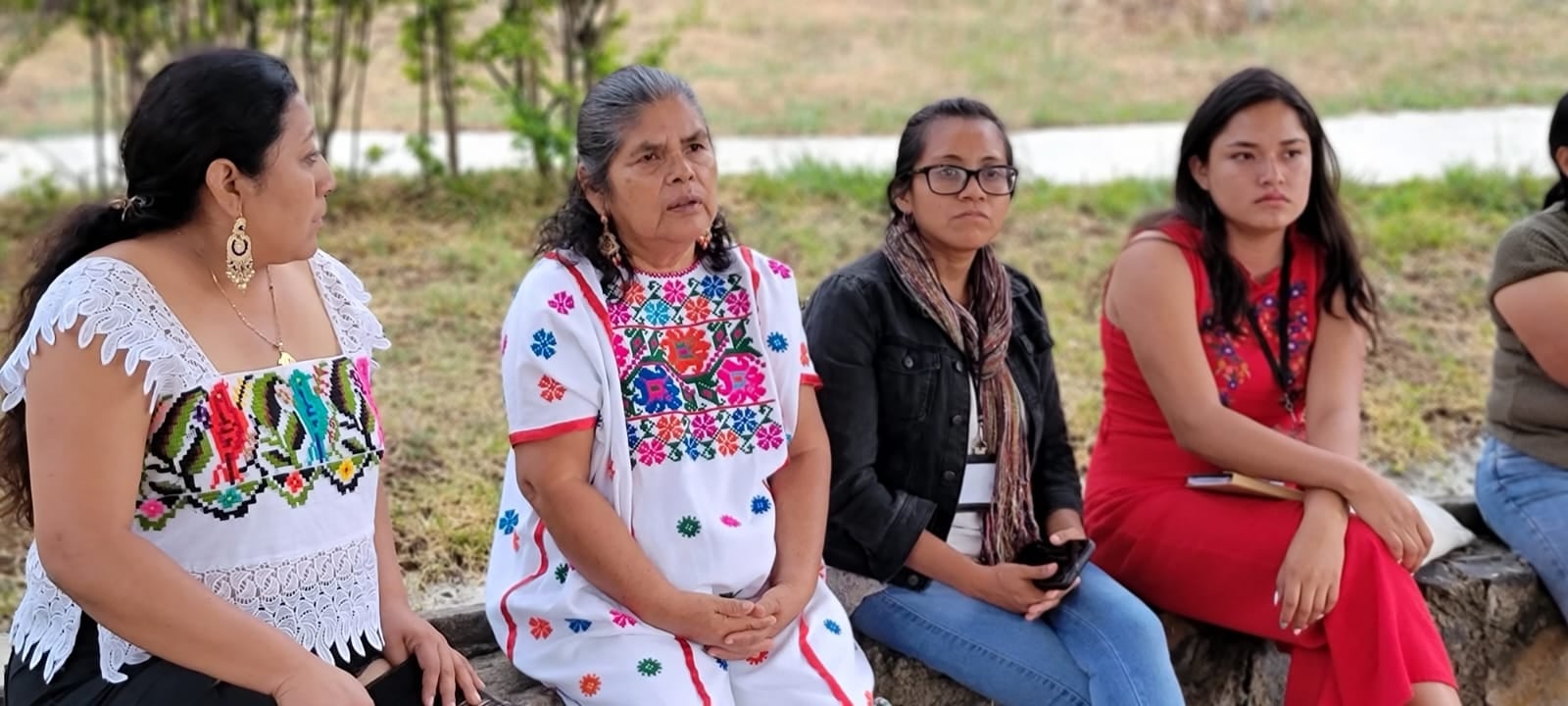2024 Indigenous Women Radio Broadcasters Exchange: Community Communicators Unite Against Extractivism!
24 Juli 2024Diana

By CS Staff
On June 7-9, 2024, the 2024 Indigenous Women Radio Broadcasters Exchange took place in Tlayacapan, Morelos, Mexico. The event was attended by 22 women communicators from Puebla, Morelos, Guerrero, Yucatán, Quintana Roo, Chiapas, and Oaxaca.
Aligned with one of Cultural Survival’s objectives to strengthen the capacities of Indigenous women radio broadcasters to amplify their voices and increase their participation in community radio stations within their territories, this meeting focused on training participants in radio editing and production. Additionally, there were reflections on critical topics for Indigenous Peoples: the right to Free, Prior and Informed Consent (FPIC) and the new threat to territories posed by the extraction of so-called transition minerals needed for the production of batteries for electric vehicles among other technologies.
Free, Prior, and Informed Consent is highlighted in International Labour Organization’s Convention 169 and the UN Declaration on the Rights of Indigenous Peoples. These instruments require states to implement them before authorizing projects that affect or benefit Indigenous Peoples. This is particularly emphasized in the context of extractivism involving so-called transition minerals, which represent a new threat of land dispossession for Indigenous territories in order to meet global market demands.
This meeting aimed to motivate participants to create compelling content on topics such as the extraction of transition minerals, which is already causing impacts on Indigenous territories. However, it is a subject that is not well understood within communities and is rarely addressed from the perspective, feelings, and needs of Indigenous women.
On June 7, all participants of the meeting, along with the Cultural Survival team, moved to the Casa de la Mujer Campesina located in the Nahua community of San José de los Laureles, Tlayacapan, where the entire event took place. It’s noteworthy that this facility is led by a group of Indigenous women, mostly elderly, and offers rental services for event spaces, dormitories, dining, temazcal (traditional steam bath), massages, and sale of natural medicine, which economically sustains this center.
During the first day of the meeting, the topic o FPIC was discussed, focusing particularly on the 2021 Inter-American Court of Human Rights’ ruling in favor of Indigenous community radio stations in Guatemala. The facilitator, César Gómez (Mama Pocomam) from Cultural Survival, posed questions to the participants such as: “Are you familiar with the right to Free, Prior and Informed Consent?” What have you heard about this topic?” Participants responded with straightforward but crucial statements: “That they should consult Indigenous Peoples,” “That they must inform us about projects they want to carry out in our community.”
Some participants highlighted the construction case of the Maya Train in the Yucatán Peninsula, Mexico, where the consultation process to obtain consent from the Maya communities residing in the region was conducted in bad faith. Additionally, they denounced that the criminalization of community leaders continues to be a serious issue.
Gómez clarified that the Inter-American Court of Human Rights ruling on the community radios in Guatemala came after more than 15 years of struggle and continuous actions and demands at the local, national, and international levels led by the members of the radio stations. For many years, these members faced criminalization, imprisonment, and raids by the Public Ministry and the Broadcasting Chamber of Guatemala.
In this case, the Inter-American Court of Human Rights ruled in favor of the Indigenous community radios and mandated the Guatemalan state to grant radio frequencies to the four stations that brought the case to the Court. This is a historic event and a precedent-setting resolution that allows Indigenous stations in other territories to access radio frequencies. Moreover, the stations benefiting from the ruling will now have a channel to continue promoting their rights, culture, and topics of interest in their own languages, effectively exercising their right to freedom of expression.
For nearly two hours, this topic was discussed with several reflections on how consultation processes to obtain Indigenous Peoples’ consent continue to be a debated issue. In many cases, consultations are manipulated, and companies interpret them as consent from the community to proceed with their projects. In response, various participants in the meeting concluded that local organization is crucial, as well as staying informed and disseminating knowledge about the consultation process. They emphasized the importance of always recognizing the self-determination of Peoples.
The second day of the meeting began with a ceremony to thank the grandmothers and grandfathers for a new day and for bringing everyone together. It was an invocation led by a member of the Casa de la Mujer Campesina, who asked for wisdom and that the meeting be a space for sharing and learning, with the intention of taking the acquired knowledge back to our villages and communities.
Subsequently, the discussion began on how the extraction of transition minerals is impacting Indigenous Peoples. This topic was led by Miguel Ángel Mijangos Leal, a member of the Civil Association for Comprehensive Processes for the Self-management of Peoples, who has worked extensively on mining issues with civil society sectors. He has also provided support and advice to Indigenous Peoples in the states of Guerrero and Oaxaca, primarily focusing on mining concerns.
Ángel reflected with the participants on how mining, particularly open-pit mining, causes irreversible damage to the land and brings about other underlying problems and consequences. These include the criminalization of land and territory defenders, water contamination, accelerated climate change, violence, drug addiction, spontaneous abortions, illnesses, as well as the murder and forced disappearance of activists and community leaders.
On the issue of extracting so-called transition minerals for transitioning to green energy, Ángel emphasized that “green energy” is a discourse imposed from the Global North to legitimize a new stage of plundering Indigenous territories, furthering the destruction of the land and humanity. In response, one participant shared: “In my village, a river has already dried up. They want to triple the corridor of wind turbines, and there has already been a community rift with over 15 community leaders murdered.”

Another point analyzed by Ángel with the participants was the issue of false consultation processes and the dispossession of lands from individual owners in communities. This has proven to be an effective strategy by mining companies to establish themselves in a region. “People or communities that lease their lands lose complete autonomy over them, receive an annual payment, and thereby lose property rights. The Maya Train is an example of how Free, Prior and Informed Consent is manipulated through various ‘processes’ in which Indigenous peoples are strategically excluded.”
Ángel continued his discussion with the participants, who agreed with him that organization through community assemblies is crucial to halt extractive projects and defend Indigenous territories. “Community assemblies have tremendous power to say YES or NO to megaprojects,” he added.
After the discussion where information was shared that needs to be addressed from the perspectives, feelings, and voices of women, the workshop on radio editing and production began. Its aim was to encourage greater participation of women in Indigenous community radios, as it is predominantly men who have taken on the role of editing and producing radio content.
The first part of the workshop focused on demonstrating the basic operation of different microphones (unidirectional, lavalier, wireless microphones). Information was also shared about the use and functions of various recorders. Later on, the workshop delved into radio formats such as interviews, spots, capsules, radio dramas, radio magazines, and documentaries. Participants also learned about creating scripts and outlines. “I have been drawn to focusing on women’s right to health, especially in live programs. I have taken into account the timing to ensure that as many women as possible listen to us; lunchtime isn’t ideal because women are busy”, mentioned one of the participants.
The workshop focused on sharing the basic steps for audio editing with the participants, using Adobe Audition software. Participants were able to learn and enhance their skills in importing audio, removing or reducing noise, mastering, equalizing, adding background music and effects, using multiple editing tracks, and exporting in various formats.
The women radio broadcasters were able to put into practice what they learned by producing radio programs on the topics discussed during the meeting. These programs were collectively presented and listened to, providing an opportunity for feedback and sharing tips to optimize and enhance future radio productions.
“I always recommend using scripts; our audiences in the communities deserve quality information. They deserve us to research and analyze the information we are going to convey. It’s not about just taking any note from the newspaper and reading it on air”, emphasized Guadalupe Pastrana (Nahua), Indigenous Rights Radio Producer at Cultural Survival and facilitator of this workshop.
As we approached the final stretch of this meeting, we formed a circle to hear the attendees’ impressions. Certificates of participation were distributed, and we closed the event with gratitude at the offering altar, led by one of the spiritual guides from the Casa de la Mujer Campesina, ending the event with joy and appreciation.
Below, we share some comments from the participants:
“The topic of transition minerals is very new; in my community, we are working on radio programming and defending our territory. Everything the workshop facilitator explained was clear and realistic, so I believe it was crucial to learn about this topic. When editing our programs, it’s important not to omit valuable information.”
“From the meeting, what stands out for me is this aspect of women’s leadership. I hadn’t noticed that there are few of us dedicated to production and editing. I admire the work of Guadalupe and all the other colleagues from Cultural Survival; they are the example to follow because in our communities, the role in radio, editing, and production is mostly taken by men. I take away the commitment to break down barriers so that women and children can share this information through radio productions.”
“It was a pleasure for me to meet new friends, and now we have a network to continue sharing materials. The editing program we learned motivates me to keep growing, and I enjoyed gaining that new knowledge to share. Let’s unite to defend our land and protect our children. Congratulations to the women who cooked; we were well taken care of and ate a lot. I take away the recipe for making tlacoyos.”
“Thank you to Cultural Survival because it’s the first time they’ve invited us from the Mixteca region. It’s a first step to learn about production and editing. I can delve deeper into the topics covered and share them with the community, since we strongly defend our territory. I take on the task of researching more and transmitting through radio programs.”
